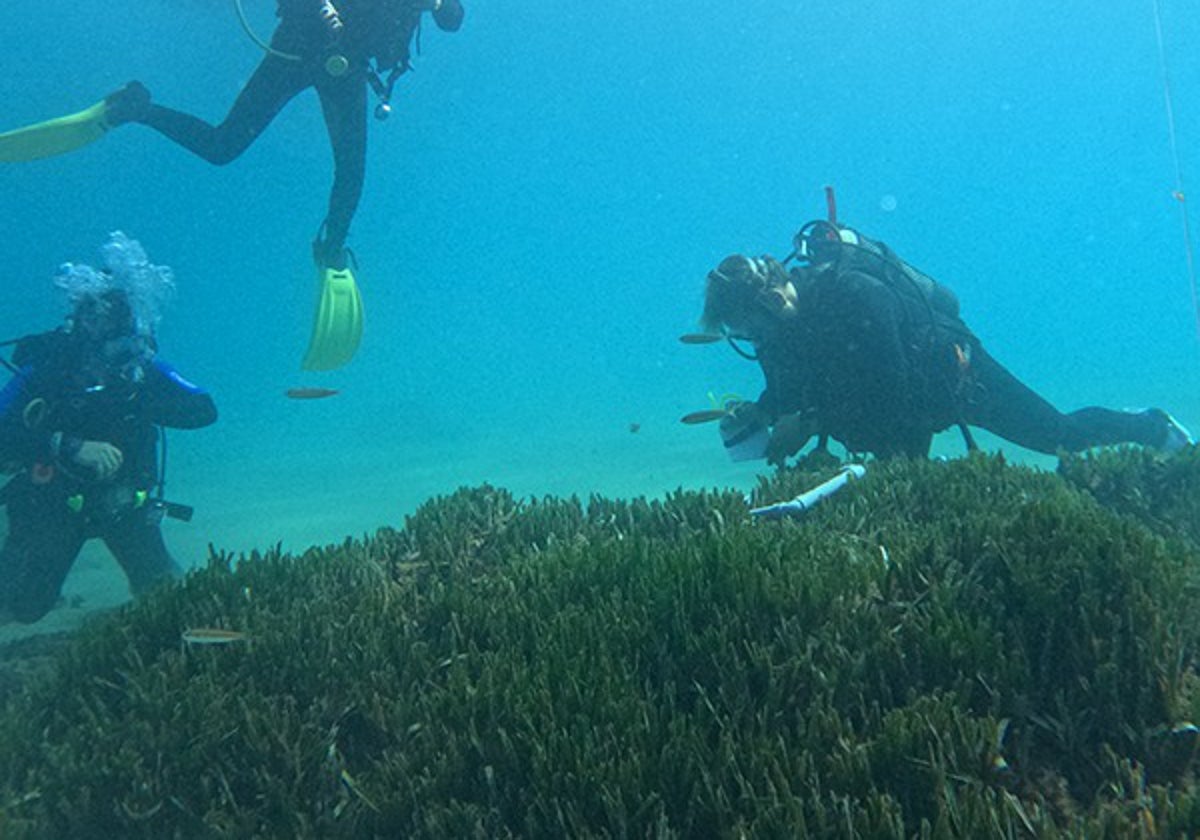Posidonias SOS: an invasive Asian seaweed is threatening its survival on the Costa del Sol
The 'Submerged Forests' study by the Aula del Mar Mediterráneo foundation is calling for urgent measures for the conservation of this endangered species
An SOS has been issued for the posidonias in the Mediterranean Sea off the Costa del Sol. The 'Submerged Forests' study, carried out by the Aula del Mar Mediterráneo foundation (with the sponsorship of Coca-Cola's Circular Seas programme), has carried out an investigation into the state of conservation of this marine plant in the Andalusian provinces of Malaga, Granada and Almeria.
Researchers have observed that most of the samples taken on the Costa del Sol are in an "unfavourable or even critical" state and are being replaced by the invasive Asian alga Rugulopteryx okamurae (R. okamurae) from Japan, China and Korea.
The study concluded that the presence of invasive species, together with the deterioration of the habitat due to human activities and rising temperatures, means urgent measures must be taken to prevent the last remaining Posidonia oceanica in this area from disappearing and in turn affecting all the associated biodiversity they harbour.
Repopulation
The foundation, with the support of Coca-Cola's Mares Circulares (circular seas), is now going to launch a pilot project to repopulate Marbella with specimens of this species. Posidonia is essential for the marine ecosystem due to its ability to sequester carbon, which is of great importance for mitigating the effects of climate change. In addition, it provides a habitat for numerous marine species, which use them as spawning grounds and safe havens for young fish.
The study, carried out during 2024, analysed the environmental status of eight Posidonia meadows located on the coasts of the provinces of Malaga (5), Granada (1) and Almeria (2). This work has been possible thanks to the collaboration of more than 150 volunteer divers.
The guidelines developed by the University of Malaga (UMA) and the Junta de Andalucía have been followed, involving the analysis of different biological and ecological indicators and including the use of sampling lines and quadrats to measure grassland cover, density and length of plant bundles, as well as the presence of associated and invasive species, particularly Rugulopterix okamurae.
The study concluded that the status of Posidonia off the Costa del Sol shows a remarkable variability, with a better overall conservation status in the eastern areas. In the area around Cabo de Gata in Almeria province, the meadows showed a healthier state, with densities and heights indicating good conservation.
In contrast, the meadows in Malaga province (between Estepona and Nerja) were in a critical state, affected by the invasion of the R. okamurae algae, which have largely displaced the endemic species. The presence of this invasive Asian algae creates a worrying situation, as competition for light and space has drastically reduced the density of the meadows, threatening their disappearance.
"Knowing the current state of posidonia in the Mediterranean is crucial to take conservation measures in the short-medium term and thus guarantee the survival of these populations," said Carmen Gómez-Acebo, Sustainability Director of Coca-Cola Europacific Partners Iberia. "In view of the results of this study, there is an urgent need to carry out conservation and restoration measures in the most degraded meadows and to avoid, as far as possible, actions that could alter and further degrade their condition. For this reason, at Mares Circulares we want to continue contributing to the protection and conservation of the marine biodiversity of our coasts".
"Posidonia is synonymous with the Mediterranean, it is its 'submerged forest', its greatest bulwark and a sign of environmental quality. The Mediterranean would not be understood without posidonia, and now these forests are being lost, especially in its westernmost point," said Juan Antonio López, president and scientific director of the Aula del Mar Mediterráneo foundation. In his opinion, "human beings are the main cause, but we can also be their main hope for recovery. With this project we want to highlight the value of posidonia and propose protection and restoration measures. There is still time".
Posidonia oceanica is an internationally, European and nationally protected species that grows in the Mediterranean Sea. Although it is categorised as a species of least concern by the International Union for Conservation of Nature (IUCN) red list, its population is in decline at several points along the Spanish coast.



Comentar es una ventaja exclusiva para registrados
¿Ya eres registrado?
Inicia sesiónNecesitas ser suscriptor para poder votar.